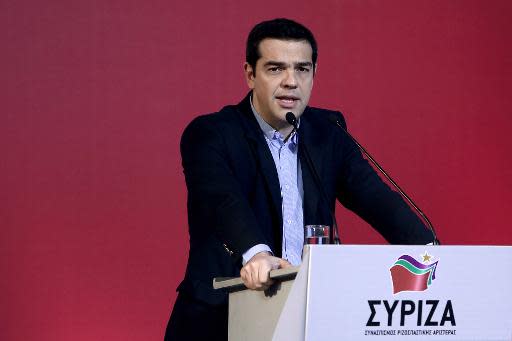Greek PM vows no retreat in 'battle' with creditors

Greece's premier on Saturday vowed no surrender in his "battle" with the country's creditors and accused other eurozone stragglers of trying to undermine its negotiations with Brussels.
"The battle will continue," Prime Minister Alexis Tsipras told the central committee of his hard-left Syriza party. "Anybody thinking that we are going to go away will be disappointed."
Tsipras said that in the talks that landed Greece a four-month extension to its bailout on Tuesday, the pressure from certain other European countries "had the character of blackmail".
"Conservative forces (in Europe) tried to set a trap for us, to drive us into financial asphyxia," the 40-year-old said.
But Athens would "not retreat from the difficulties or from our own principles," he vowed.
According to Tsipras, Greece came up against "an axis of powers led by Spain and Portugal" who tried to scupper the negotiations to "avoid internal political risks".
His remarks were seen as a reference to the rise of anti-austerity parties in Spain and Portugal, who have been buoyed by Syriza's arrival to power.
In Spain, which did not receive a full bailout but whose banks got emergency support in 2012, Podemos, a close Syriza ally, is leading polls ahead of general elections expected later this year.
Syriza won January elections on a promise to ease the hardship caused by past government spending cuts imposed in return for two bailouts in 2010 and 2012.
Tsipras reiterated Friday that once the current bailout expires on June 30 there would be no "third memorandum" as the previous agreements tying aid to spending cuts are known.
"Memorandums are finished," he said.
- Mountain to climb -
Is it unclear, however, whether Tsipras can avoid another rescue package.
His "government of social salvation" faces a major challenge in keeping both voters and Greece's international creditors happy by providing relief for the poor while also keeping government spending in check.
Thursday saw the first protests in Athens since the bailout extension, with several hundred anti-capitalists and anarchists taking to the streets, some smashing shop windows and setting fire to rubbish bins.
Greece, whose two bailouts are worth 240 billion euros ($270 billion) must also repay billions of euros in debt maturing in the coming months.
Tsipras has said he wants to renegotiate the country's 320-billion-euro debt pile, despite fierce opposition, particularly in Germany, to any new debt "haircut".
Meanwhile, Greece's nascent recovery from six straight years of recession also looks in trouble, with official data on Friday showing a contraction of 0.4 percent in the fourth quarter.
Initial estimates had forecast a 0.2 percent drop in gross domestic product.
After winning four months of breathing space from its creditors, the government now has until the end of April to provide them with more details of its reform programme in order to receive the final bailout tranche.
A list of reforms submitted by Athens this week, which focused on tackling tax evasion and excessive bureaucracy, was described by German Chancellor Angela Merkel as just a "starting point".
Germany's parliament approved the bailout extension Friday, despite a minor rebellion by members of Merkel's party, surveys suggesting German voter unease and the country's Bild daily saying "greedy" Greece should get no more money.
On Saturday, Yanis Varoufakis, Greece's maverick new finance minister, promised "no pity" in tackling tax evasion and said that the government might impose a one-off levy on the rich to help fill government coffers.
"What interests us is those who have money but who have never paid (tax). They are our target and we will show no pity," Varoufakis told the TV channel Skai.
Tsipras said Friday the government would table legislation early next week aimed at alleviating poverty and putting the country of 11 million on a more equitable road to recovery.
His plans include free electricity for 300,000 poor families, housing for 30,000 people and measures to protect people at risk of losing their homes.

 Yahoo Finance
Yahoo Finance 